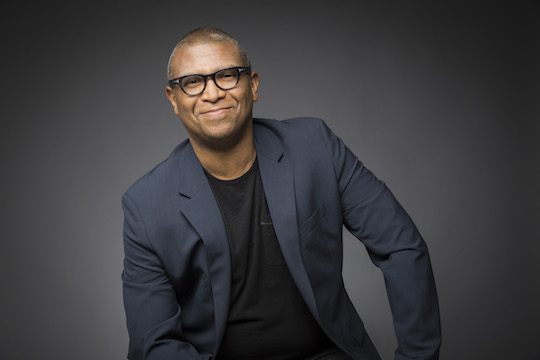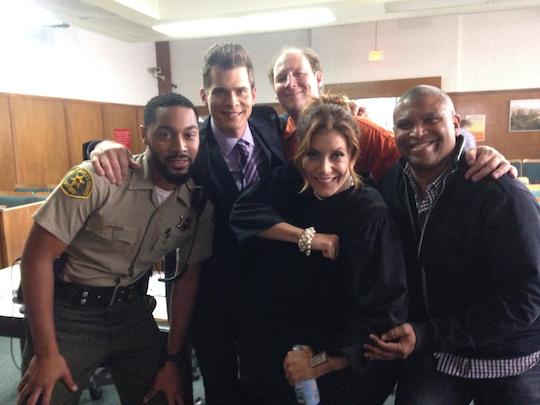by Mike Fleming Jr
September 10, 2014 5:38pm
.jpg)
EXCLUSIVE: IM Global’s Stuart Ford has been in Toronto selling out to the walls on The Secret In Their Eyes remake as Julia Roberts joined Chiwetel Ejiofor and Gwyneth Paltrow. Now, he’s just set up a new film here. They’ve set Reginald Hudlin to direct and produce an untitled comedy which he co-wrote, with CAA selling the domestic rights and Hudlin producing through his Hudlin Entertainment banner. Hudlin, fondly remembered for helming the sleeper hit House Party, most recently was Oscar nominated for producing the Quentin Tarantino-directed Django Unchained. Hudlin wrote the script with Chris Spencer (Real Husbands of Hollywood) and Eric Daniel. He separately wrote the graphic novel The Black Panther for Marvel Comics and exec produced the animated series, and he has directed episodes of TNT’s Murder in the First and the upcoming NBC shows Bad Judge and Marry Me, and the Fox sitcom Weird Loners. He has a deal at Fox 21 and is also producer of the NAACP Image Awards. IM Global’s Ford and Matt Jackson will be exec producers and IM Global will sell international. Hudlin’s repped by CAA and attorney Darrell Miller while Spencer is repped by Parallel Entertainment.
Comment
+ Permalink

Los Angeles, CA – Reginald Hudlin will produce the 6th Annual Governors Awards for the Academy of Motion Picture Arts and Sciences, Academy President Cheryl Boone Isaacs announced today. The Jean Hersholt Humanitarian Award will be presented to Harry Belafonte, and Honorary Awards will be presented to Jean-Claude Carrière, Hayao Miyazaki and Maureen O’Hara, on Saturday, November 8, at the Ray Dolby Ballroom at Hollywood & Highland Center®.
“With Reggie’s experience, unique vision and immense creativity, the evening celebrating those who have given so much to our industry is certain to be a memorable one,” said Boone Isaacs.
"I’m honored to be working with the Academy again,” said Hudlin. “The collective impact of this year’s Governors Awards recipients on the evolution of cinema is immeasurable. I’m a fan of all four of these legends, so producing a celebration of Ms. O’Hara’s performances, Mr. Carrière’s storytelling, Mr. Belafonte’s dedication and Mr. Miyazaki’s magic is a pleasure."
A writer, director, producer and pioneering entertainment executive, Hudlin received a Best Picture Oscar® nomination as a producer of “Django Unchained.” His feature directing credits include “The Great White Hype,” “Boomerang,” and “House Party,” which he also wrote; he also has directed episodes of such popular television series as “Psych,” “Modern Family,” “The Office” and “The Bernie Mac Show.” Hudlin recently produced “The Academy Celebrates the Black Movie Soundtrack” concert at the Hollywood Bowl and has executive produced the NAACP Image Awards show for the past two years. He is a member of the Academy of Motion Picture Arts and Sciences, Directors Guild of America, Writers Guild of America and Screen Actors Guild, and serves on the executive board of the UCLA School of Theater, Film and Television.
Comment
+ Permalink

The week before my Hollywood Bowl Black Movie Soundtrack concert I shot an episode of BAD JUDGE, the new NBC series debuting this fall. Everyone in this picture is super damn funny and great to work with. Tone Bell, John Ducey, Kate Walsh and guest star Dan Bakkedahl just cut up every day.
Comment
+ Permalink

Thu, August 28th, 2014 at 9:58am PDT
Multi-talented writer/director/producer Reginald Hudlin joined CBR columnist Joseph Illidge on the CBR Yacht at Comic-Con International in San Diego for a lengthy discussion of his career, his trendsetting resume and his relationship with fans and fellow creators. Hudlin talks about what drew him to characters like Black Panther, where the idea of Quentin Tarantino’s "Django Unchained," on which he served as a producer, came from and why audiences often react poorly even when you give them the stories they claim to want. He also discusses why he has so many longstanding creative partnerships across various media and how your business partners are more than just individuals. He also discusses the hotly-anticipated "Django/Zorro" crossover from DC Comics/Dynamite, why "Django" became a worldwide success despite straddling two difficult genres and the keys to his own success.
On gravitating toward Black characters and heroes who are forerunners: I like heroes. Those characters were all heroes, and unfortunately the media has a shortage of Black heroes. I grew up on the Black Panther, I loved the character. I loved all the Black super heroes — I loved Luke Cage, I loved Storm. The pleasure of writing "Black Panther" was taking those characters have them have the conversations I always felt they were having in real life but didn’t show up in the pages of the book. I’m like, "I’m sure Luke Cage thinks Black Panther’s awesome. I’m sure that Luke Cage is really attracted to Storm, but Storm’s not gonna give him any. I’m sure, conversely, Black Panther’s hitting it." [Laughs] So let’s put that in a book! That was exciting.
On the genesis of "Django Unchained" and the failure of most slave movies: With "Django," that just came out of a conversation that Quentin [Tarantino] and I had had years and years before about slave movies and how they almost always disappointed me. I always thought there was only one truly great movie about slavery, and it was called "Spartacus." And until we made a movie about that, about the American experience, I wasn’t interested. Without the cathartic relief I can’t take all the brutality. So "Django" was — [Tarantino] took that broad concept and crystallize it into a really brilliant character.
On giving audiences the stories they crave and then receiving backlash for doing so: At this point I accept it as the cost of doing business. The reality is part of what’s shocking and offending people that I think they’re not aware of is that these stories are so rarely told that they are uncomfortable seeing them because they know that there are rules being broken. This is not business as usual and maybe they shouldn’t be looking at this. … I’m going there, I’m living there. What’s also funny is that, after the fact, these things that are so shocking or accepted as "Well, of course," so that’s happened pretty consistently over my career.
When I was doing "House Party" everybody was like, "What?! You can’t make a movie about just kids going to a party." I was like, "Well, there’s ‘Risky Business.’ There’s a lot of movies about kids going to a party." When I made "Boomerang" they were like, "A black romantic comedy and they’re always in these fancy suits?" I’m like, "Yeah, but they’re cool and they’re fun and what’s the difference?" So even things that seem very innocuous are shocking.
On maintaining positive business relationships: Business relationships are just that. I just feel like we’re in a very tough business, we’re in a very dynamic business, and it’s really important to treat your partners well. And I just don’t mean individual creators, I also mean, you know, make sure I have a good relationship with Marvel; to make sure I have a good relationship with Universal; to make sure I have a great relationship with DC; have a great relationship with a record company. These are all people — obviously we know corporations are all people now. [Laughs] The bigger thing is like, these are individuals who bet on you, who committed to you, who put a certain amount of risk on saying, ‘This person is good person.’ You have to respect that. We may not agree with decisions that everybody makes, but you have to say, "Well, you know that worked well together and how do we maintain that?" That was one of the great benefits of being an executive, because I’m been a writer, a producer, a director — I’ve had different jobs. To be on the other side of the desk and to say, "Oh, these are the relationships that are great. These are the relationships that are not great," so now when I’m back I remember that worldview that I developed being an executive and I try to be the best guy on the other side of the desk.
On how a Black Western became a bona fide hit despite the odds stacked against it: When you present a really good movies that happens to not have happened this year, people love it because it’s an exciting story. So again, these false conclusions have nothing to do with reality. "Django Unchained," which — talk about two questionable genres. You have a Black movie and a Western. Cut to us making a half a billion dollars worldwide. Okay? So Western movies don’t travel, Black movies don’t travel, but somehow this Black Western made money all over the world. Now, of course someone can say, "Well, here’s all the reasons why that worked," butt he bottom line is, yeah, it was a good movie with talented people and it made a lot of money, so let’s make another one of those. Don’t act like, "That one’s some crazy accident!" How many exceptional circumstances does it take before something is an actual trend.
On why there has to be a little bit of love in everything that you do: I’m always working on personal projects. At the end of the day, me directing TV earns way more money than me writing a comic book. But me writing a comic book is a pure expression of my creativity. And people go, "You did that thing I loved." So you’ve gotta do both. You’ve gotta do it all until such a point where you can only do what you love. But love must always be in the equation because love is transcendent and if you make something not because you think it’s gonna make a lot of money, but because you love it, the audience responds to that love. There are people who go, "I hate that movie! Why do people like that filmmaker?" And I go, "Because he’s not talking down to audiences. He’s doing what he believes in." And that belief, that love, that act of love in that art form connects to people who are right there with him. It may not be for everybody — it doesn’t have to be. It has to be just for enough people that you keep making another one.
Comment
+ Permalink
.jpg)



